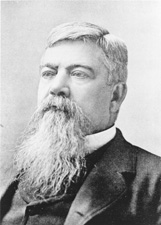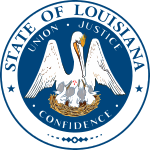
Robert Lowry was an American politician and lawyer who served as the 32nd governor of Mississippi from 1882 to 1890. Before entering politics, he was a senior officer of the Confederate States Army who commanded infantry in the Western Theater of the American Civil War.

The White League, also known as the White Man's League, was a white paramilitary terrorist organization started in the Southern United States in 1874 to intimidate freedmen into not voting and prevent Republican Party political organizing. Its first chapter was formed in Grant Parish, Louisiana, and neighboring parishes and was made up of many of the Confederate veterans who had participated in the Colfax massacre in April 1873. Chapters were soon founded in New Orleans and other areas of the state.

Donelson Caffery was an American politician from the state of Louisiana, a soldier in the American Civil War, and a sugar plantation owner.

The 1952 Louisiana gubernatorial election was held in two rounds on January 15 and February 19, 1952. Like most Southern states between the Reconstruction Era and the Civil Rights Movement, Louisiana's Republican Party was virtually nonexistent in terms of electoral support.

United States gubernatorial elections were held in four states. Kentucky and Mississippi held their general elections on November 4. Louisiana held the first round of its jungle primary on October 4 and the runoff on November 15. In addition, California held a recall election on October 7.

The 1983 Louisiana gubernatorial election was held to elect the Governor of Louisiana. Incumbent Republican Governor Dave Treen lost re-election to a second term, defeated by former Democratic Governor Edwin Edwards. Edwards became the first governor since Earl Long to win non-consecutive terms. He also became the first to serve three full terms.

The 1979 Louisiana gubernatorial election resulted in the election of David Treen as the first Republican governor of Louisiana since Reconstruction. Incumbent Governor Edwin Edwards was ineligible to run for a third term.

The 1975 Louisiana gubernatorial election resulted in the re-election of Edwin Edwards to his second term as governor of Louisiana. This was the last time that a Democrat was re-elected to a second consecutive term as governor of Louisiana until 2019, 44 years later, when John Bel Edwards won re-election.

The 1932 Louisiana gubernatorial election was held on January 19, 1932. Like most Southern states between the Reconstruction Era and the Civil Rights Movement, Louisiana's Republican Party had virtually no electoral support. This meant that the Democratic Party primary held on this date was the real contest over who would be governor. The election resulted in the election of Oscar K. Allen as governor of Louisiana. Louisiana was one of only two states that held the election on a date other than the first Tuesday following the first Monday of November.

Voters in Louisiana's 1st congressional district voting in a special election on May 3, 2008, elected Steve Scalise as a new member of the United States House of Representatives, replacing Representative Bobby Jindal who resigned on January 14, 2008, to become Governor of Louisiana.

The 1900 Louisiana gubernatorial election was held on April 17, 1900. This was the first state election after the adoption of Louisiana's 1898 constitution, which disenfranchised nearly all of the state's Black voters, who had been the core supporters of the Republican Party. The constitution had been prompted by the unusually strong voter support for Republicans and Populists in the 1896 Louisiana gubernatorial election.

The 1859 Louisiana gubernatorial election was the third election to take place under the Louisiana Constitution of 1852. As a result of this election Thomas Overton Moore became Governor of Louisiana. This was the last Louisiana gubernatorial election before the outbreak of the Civil War.

The 1876 Louisiana gubernatorial election was the third and final election to take place under the Louisiana Constitution of 1868. As a result of this election Francis T. Nicholls became Governor of Louisiana, but not before the election was contested by his opponent. The results of this election, like those of 1872, were disputed. The dispute was resolved by the Compromise of 1877 which gave the Governor's Mansion to Democrat Francis T. Nicholls. The Compromise also gave Republican presidential candidate Rutherford B. Hayes the electoral votes of several disputed states, including Louisiana, which resulted in his election to the White House. The election of Nicholls marked the end of Reconstruction in Louisiana and the decline of the Republican Party of Louisiana.
The 1877 Virginia gubernatorial election was held on November 6, 1877 to elect the governor of Virginia. The Republicans failed to nominate a candidate in this election, and as a result Democratic nominee and former Confederate congressman Frederick Holliday faced no opposition. This is the only gubernatorial election in Virginia history in which a candidate has run unopposed.

United States gubernatorial elections were held on November 5, 2019, in Kentucky and Mississippi, and November 16, 2019, in Louisiana. These elections formed part of the 2019 United States elections. The last regular gubernatorial elections for all three states were in 2015. The Democrats had to defend an incumbent in Louisiana, while the Republicans had to defend an incumbent in Kentucky plus an open seat in Mississippi. Though all three seats up were in typically Republican states, the election cycle became unexpectedly competitive: Kentucky and Louisiana were seen as highly contested races; and Mississippi's race ultimately became closer than usual, despite being seen as favorable for the Republicans.

The 1861 Alabama gubernatorial election took place on August 5, 1861 in order to elect the governor of Alabama. Democrat John Gill Shorter won his first term as governor.

The 1864 Maryland gubernatorial election took place on November 8, 1864. Incumbent Union Party Governor Augustus Bradford did not run for re-election. Union Party candidate Thomas Swann defeated Democratic candidate Ezekiel F. Chambers.

The 1861 Maryland gubernatorial election took place on November 6, 1861. It was held amid the early phases of the American Civil War and was contested between the Unionist Party's Augustus Bradford and the Democratic Party's Benjamin Chew Howard. Bradford supported the maintenance of the Union while Howard advocated for a peace treaty with the Confederacy. Concerned about pro-secession elements in the state, the federal government sent troops to supervise the vote and ordered electors to take an oath of loyalty to the Union. The election was won by Bradford with 68.8% of the votes.
In 1863, amid the American Civil War, two gubernatorial elections were held as a result of this dispute, a Confederate election and a Union election.












